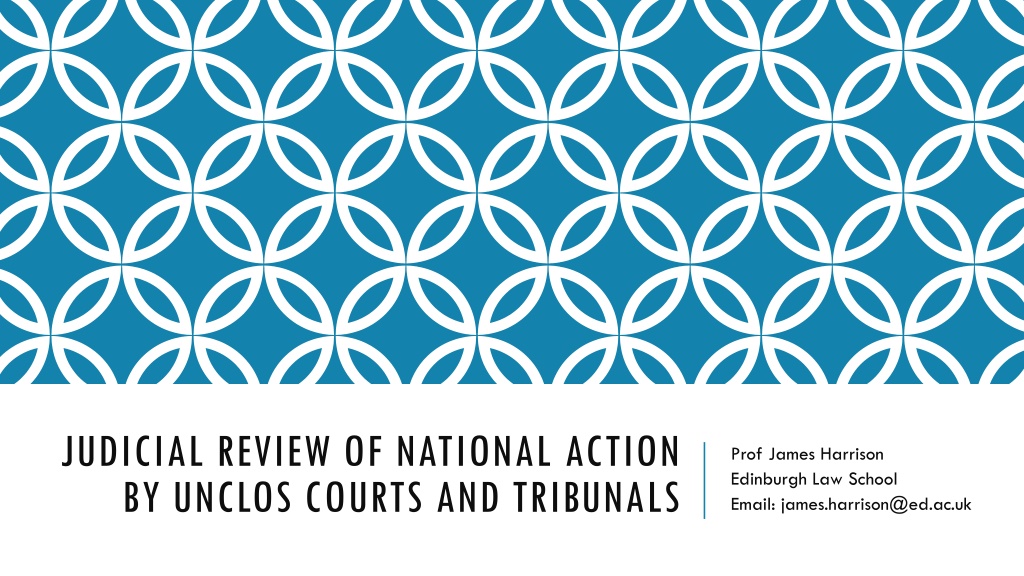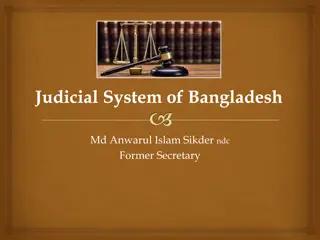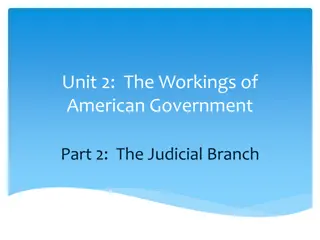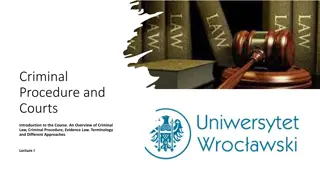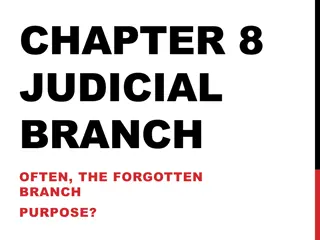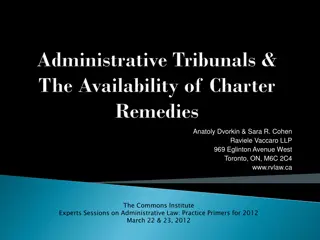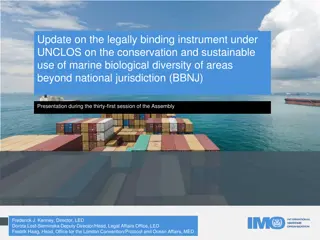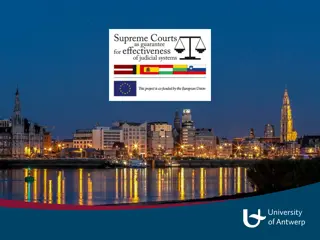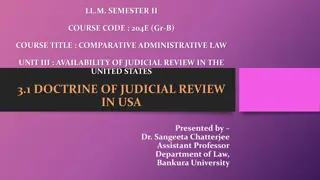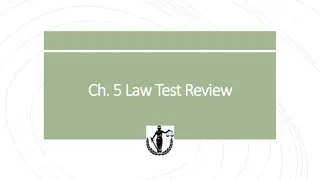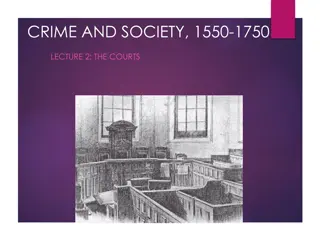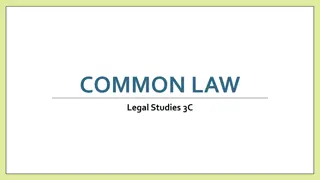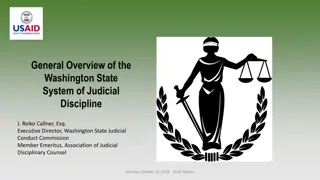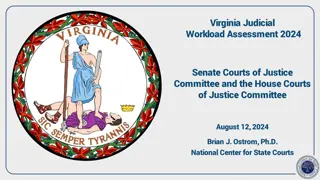JUDICIAL REVIEW OF NATIONAL ACTION BY UNCLOS COURTS AND TRIBUNALS
International judicial review involves oversight by international courts and tribunals over the actions of States Parties in implementing their international commitments. UNCLOS courts exercise supervisory jurisdiction through grounds of review like due regard, reasonableness, necessity, and proportionality. Balancing judicial oversight with state discretion is crucial to ensure lawful exercise of rights and obligations under the Convention.
Download Presentation

Please find below an Image/Link to download the presentation.
The content on the website is provided AS IS for your information and personal use only. It may not be sold, licensed, or shared on other websites without obtaining consent from the author. Download presentation by click this link. If you encounter any issues during the download, it is possible that the publisher has removed the file from their server.
E N D
Presentation Transcript
JUDICIAL REVIEW OF NATIONAL ACTION BY UNCLOS COURTS AND TRIBUNALS Prof James Harrison Edinburgh Law School Email: james.harrison@ed.ac.uk
QUESTIONS To what extent is it plausible to talk about UNCLOS courts and tribunals carrying out what may be called judicial review over the actions of States Parties? What is the significance of such a term, and what might it mean for the exercise of the judicial function? How have UNCLOS courts and tribunals responded in cases which might be classified as involving international judicial review of national state action? How do we balance judicial oversight of state action with recognising that state s may have some discretion in choosing how they exercise rights or implement obligations? How do you frame judicial decision-making in such situations to ensure predictability, whilst also maintaining enough flexibility to take into account individual circumstances on a case-by-case basis?
STRUCTURE OF THE PRESENTATION 1. The concept of international judicial review 2. Grounds of review in the law of the sea 3. Approach of UNCLOS courts and tribunals to grounds of review 4. Reflections
THE CONCEPT OF INTERNATIONAL JUDICIAL REVIEW International judicial review refers to situations where a state has some discretion in how it implements its international commitments, subject to oversight by an international court or tribunal ( bounded discretion ) Courts and tribunals therefore exercise a form of supervisory jurisdiction in which they do not dictate how discretion must be exercised, but rather whether a particular exercise of discretion was lawful This function is conferred on courts or tribunal by virtue of grounds of review embedded in the relevant international rules grounds of review tend to be expressed through standards, such as due regard, reasonableness, necessity, proportionality The interpretation of grounds of review is a subtly different interpretative exercise compared to classic interpretation and application of objective terms of a treaty The open-ended nature of the grounds of review requires not only identification of the different factors that must be considered and balanced when taking action under the Convention, but also an appreciation of the degree of deference, if any, that must be given to states when courts or tribunals are reviewing their action There are important differences with national judicial review, particularly in terms of timeframe and remedies, which may influence how we approach the issue
GROUNDS OF REVIEW IN THE LAW OF THE SEA Grounds of review tend to be expressed through explicit standards embedded in relevant treaty provisions, such as due regard, reasonableness, necessity, proportionality E.g. The notion of necessity is employed more than 100 times in the UN Convention on the Law of the Sea (UNCLOS), in a variety of provisions and contexts Grounds of review may apply to both rights and obligations Grounds of review may also be implied E.g. Duzgit Integrity (2016) para. 209: the exercise of enforcement powers by a (coastal) State in situations where the State derives these powers from provisions of the Convention is also governed by certain rules and principles of general international law, in particular the principle of reasonableness. This principle encompasses the principles of necessity and proportionality. These principles do not only apply in cases where States resort to force, but to all measures of law enforcement. Article 293(1) requires the application of these principles. There is no single meaning to be ascribed to these grounds of review, which may have different connotations depending on the context and the objective of the provision in which it is used indeed grounds of review are fact-intensive and context-dependent (see separate opinion of Judge Paik in the M/V Virginia G) meaning that their interpretation/application must take into account the individual circumstances of a particular case However, grounds of review should not be viewed as completely subjective and there is a need to identify a principled-approach to how we interpret and apply these grounds of review
APPROACH OF UNCLOS COURTS AND TRIBUNALS TO GROUNDS OF REVIEW Rights of coastal state Obligations of flag state M/V Virginia G determination of whether confiscation of the vessel and cargo by Guinea-Bissau was necessary for the purposes of Article 73(1) of UNCLOS South China Sea Arbitration determination of inter alia whether China had taken measures necessary to protect and preserve rare or fragile ecosystems etc under Article 194(5) Duzgit Integrity determination of whether the penalties imposed by Sao Tome e Principe, as an archipelagic state exercising enforcement powers in its archipelagic waters, were reasonable, necessary and proportionate Fisheries Advisory Opinion - ITLOS makes a link between due diligence and necessary measures: The flag State is under the due diligence obligation to take all necessary measures to ensure compliance and to prevent IUU fishing by fishing vessels flying its flag (para. 129) Arctic Sunrise determination of whether there was an unjustifiable interference with navigation and other rights and freedoms of other States under Article 78(2) of UNCLOS Chagos MPA Arbitration determination of whether the UK had due regard in accordance with Article 56(2) of UNCLOS to the rights and interests of Mauritius before establishing an MPA around the Chagos Archipelago
REFLECTIONS ON INTERNATIONAL JUDICIAL REVIEW UNDER UNCLOS Grounds of review can operate as a floor or a ceiling, depending on whether they are attached to obligations or rights Most grounds of review involve some form of balancing between different interests, often including interests of non-state actors (ship owners, crew members, cargo owners, etc) There may be a role for deference to the decision-maker, particularly in the precise balance to be struck between competing interests, but deference is inevitably limited Some key principles which may indicate whether discretion has been exceeded will be: consistency of state s unilateral statements/policy/actions and the nature of the challenged measure consistency with international standards which show consensus support for a particular objective or measure The more explicit courts and tribunals can be in their interpretation and application of grounds of review , the better, both for the legitimacy of their role, as well as for future guidance for states in the exercise of their rights and obligations under UNCLOS
